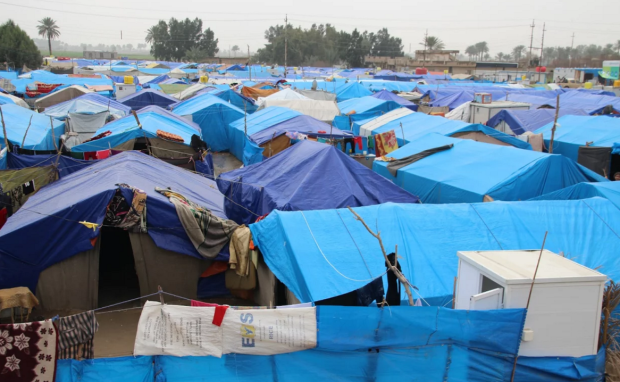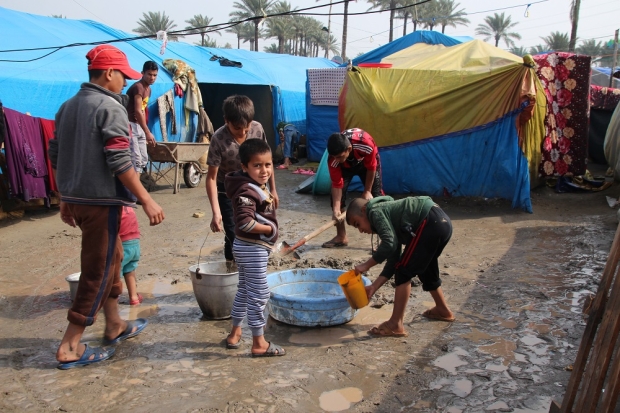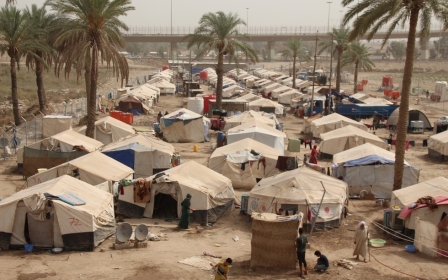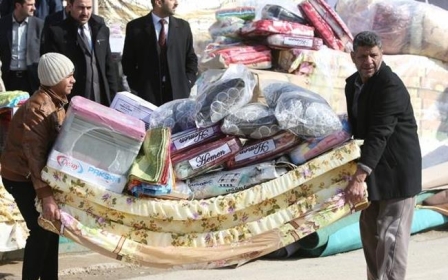Thousands face starvation in Iraq's Fallujah as siege tightens
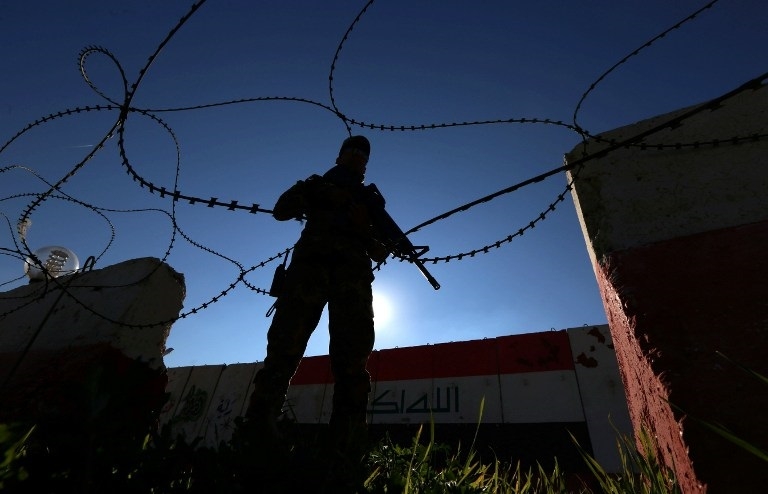
BAGHDAD - Tens of thousands of Iraqis, trapped in the Islamic State-held Fallujah, have been left without regular access to food and medicine as shortages have intensified in recent weeks.
Residents and local officials all complain of rampant shortages and say that the situation is growing desperate as the pro-Baghdad forces continue to tighten their grip on the city, while the Islamic State (IS) group grows ever bloodier and more desperate inside.
Four newborn babies and six elderly people have died from malnutrition or access to baby milk and medicine in the last two months, Essa Sayeer al-Essawie, Fallujah’s mayor who is stationed just outside the besieged city, told Middle East Eye by phone.
The city, which is now home to around 50,000 people, has been under siege by the Iraqi army since early 2014 when IS seized the city - making it the first Iraqi town to fall to the militants. However, the restrictions have now grown much harsher and don’t look likely to ease up anytime soon.
"Providing daily meals for our families has become a great achievement for all of us," Hameed, a resident told Middle East Eye by phone from the besieged city.
"I do not care if they [the IS fighters] killed me or not, I have to get food for my family," he added.
Tightening grip
The current crisis dates back to early January when, after months of trying, pro-Baghdad forces, backed by US-led anti-IS coalition air strikes, drove IS from Ramadi, the capital of the restive Anbar province that lies some 40 kilometres from Fallujah.
With IS defeated in the provincial capital, the battle shifted east and the once loose siege of Sunni-dominated Fallujah was severely tightened by the Iraqi army and pro-government Shia-dominated paramilitary troops.
Fallujah is seen by most Iraqis as the hometown of al-Qaeda in Iraq and its offshoot the Islamic State and was a hotbed of militant activity during the US-led occupation following the invasion to oust former president Saddam Hussein in 2003.
Hameed said that just about everyone he knew from his immediate family to distant relatives and many neighbours had now depleted the last of their food supplies and had not been able to procure any medication for months.
They have also not had fuel at all this winter, despite the bitterly cold weather that swept through this part of Iraq.
Goods are available at some local shops, but these tend to be run by IS or IS sympathisers who charge extortionate rates, Hameed said.
Before, one could negotiate down the price on some goods, but as the siege has tightened and IS’s fortunes reversed in Anbar, IS has driven prices up even higher to make up for lost revenue.
According to the city’s mayor as well as several residents who MEE was able to reach by phone, the price of basic foodstuffs has skyrocketed.
Flour is more than 30 times more expensive than in the capital Baghdad while rice is nine times more and sugar 10 times more expensive.
As IS have come under threat, food has also become a weapon.
Residents and local officials told MEE that IS has started using food to try to control the population that it worries is trying to break free of its control.
Last week, armed clashes broke out in a market in central Fallujah after local tribesmen tried to challenge IS’s authority for the first time.
According to residents and local officials in Anbar who talked to MEE, IS was able to subdue the tribesmen after it detained more than 100 people, sparking fears of a mass execution. Ten people were killed in the fighting that raged for two days, residents and tribal sources said.
After the guns fell quiet, IS distributed food to its fighters, but deprived anyone believed to have links to the tribesmen, sources said.
"They would give me some of this material [food] if I was one of their flock,” Abu Ahmed, a resident, told MEE by phone.
“They have been providing their people with flour, rice, sugar and oil from time to time but those infidels [IS fighters] do not care about us and we do not know for how long this will last.”
With the most vulnerable already dying and medical supplies growing scarcer by the day, fears are that things are set to get much worse.
"The humanitarian situation in Fallujah is very bad,” Essawie, the mayor of Fallujah, told MEE.
“People cannot find anything to eat. The prices are very high and there is no food, no milk, and no medicine. Nothing has been allowed to get into the city for months.
"The city is under the control of Daesh [IS] and is surrounded by the army, so nothing can get in. Aid groups want to send in food but they will not do as long as there are military operations," he added.
Federal and local officials told MEE that the Iraqi authorities and the US-led international military coalition have rejected repeated requests from the governor of Anbar and local tribal chiefs to airdrop in humanitarian supplies.
They are "afraid that IS fighters will get them and use them to sustain their control over people," Majeed al-Jeraissi, a local tribal leader who is heading up efforts to relieve the situation inside Fallujah, told MEE.
Colonel Christopher Grover, the spokesman for Operation Inherent Resolve (OIR), the US military operation against IS told the MEE by phone that the US is "indeed very concerned about the situation inside of Fallujah.
"We are working with the Iraqi government and the Iraqi security forces to determine the best way to help the people of Falluja, but we are concerning that when send them airdrops of supplies (it) may fallen to the hands of Daesh [IS]," Grover said.
"Because that the area is controlled by Daesh [IS], its difficult to know exactly how bad the situation (inside Fallujah) is, but the fact that the area is controlled by Daesh [IS], we are concerned about it in the first place," he said, adding that US would support a plan that the Iraqi government was developing.
Ongoing negotiations
Iraqi officials said that negotiations led by the International Red Cross have been going on in an attempt to get IS to allow some aid teams to enter into the city and provide basic assistance. However, these negotiations have not been successful yet.
Hekmat Sulaiman, the spokesperson for Anbar's governor, said that the Iraqi army has not been able to prevent food from getting in but that IS has blocked efforts.
“Now there are negotiations and mediation efforts led by the Red Cross to convince them [IS] to let food get in.”
A senior federal security official confirmed the negotiations, but declined to specify whether the talks were happening with IS leaders inside the city, or elsewhere.
IS controls vast swathes of Iraq, including the country’s second city Mosul. While anti-IS forces – from the Kurds to the north to Shia-dominated troops in the west – have been making progress, Fallujah seems low down on the priority list.
With Ramadi and several other towns east of Fallujah now in Baghdad’s hands, the drive appears to have cooled off, with pro-Baghdad forces seemingly content with encircling the city and not trying to take it.
"We need some time to re-organise our troops,” General Sami al-Aaridhi, a commander of the Terrorist Squad troops told MEE from Ramadi. “We need to take a break and decide our next target.
“Fallujah is not our next target. We still have to re-take Hit, Rawaa, Anna and Qaim towns (west of Ramadi) before [we] think about Fallujah," he added.
Middle East Eye propose une couverture et une analyse indépendantes et incomparables du Moyen-Orient, de l’Afrique du Nord et d’autres régions du monde. Pour en savoir plus sur la reprise de ce contenu et les frais qui s’appliquent, veuillez remplir ce formulaire [en anglais]. Pour en savoir plus sur MEE, cliquez ici [en anglais].


